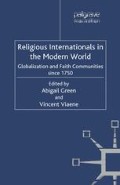Abstract
In keeping with other world religions, Islam had a universalist profile from the outset. Although the caliphate, a universalist religiopolitical institution, ceased to actually govern more than a small portion of the Islamic world quite early on, the expansion of Arabic as a lingua franca and centripetal religious impulses such as the annual pilgrimage and the search for knowledge (talab al-‘ilm) undertaken by scholars created a startlingly well-integrated society which transcended the political boundaries of the time.1 Although this society was primarily an elite one, the umma, the universal community of all Muslims, existed in the imagination of Muslims from every walk of life.
Access this chapter
Tax calculation will be finalised at checkout
Purchases are for personal use only
Preview
Unable to display preview. Download preview PDF.
Notes
See Amira K. Bennison, ‘Muslim Universalism and Western Globalization’, in A. G. Hopkins, ed., Globalization in World History (London: Pimlico, 2002), pp. 74–97.
Marshall G. S. Hodgson, The Venture of Islam: Conscience and History in a World Civilisation, Vol. 3, The Gunpowder Empires and Modern Times (London and Chicago: University of Chicago Press, 1974 [1961]).
Amira K. Bennison, Jihad and Its Interpretations in Pre-Colonial Morocco (London: RoutledgeCurzon, 2002), pp. 89, 93, 100 et passim.
Alexander Knysh, ‘Shamil’, in Encyclopedia of Islam, vol. 9, 2nd edn (Leiden: Brill, 1960–), p. 283.
Alexandre Bellemare said that the three greatest men of his time were ‘Abd al Qadir, Muhammad ‘Ali Pasha of Egypt and Shamil, an observation then quoted by Muhammad b. ‘Abd al-Qadir in his biography of his father, which corroborates the above point about the growing desire of Middle Easterners to cite European sources. Alexandre Bellemare, Abd-el-Kader sa vie politique et militaire (Paris: Hachette, 1863), p. 3;
Muhammad Ibn ‘Abd al-Qadir, Tuhfat al-za’ir fi ta’rikh al-Jaza’ir wa’l-Amir ‘Abd al-Qadir (Beirut: Dar al-Yaqza al-‘Arabiyya, 1964), p. 8.
‘Abd al-Rahman (al-Sayyid al-Furati) al-Kawakibi, Umm al-Qura: Record of the Discussions and Decisions of the Conference ‘The Islamic Revival’ Held in Mecca the Noble in the Year 1316 AH (Cairo, 1899). Bound with similar materials in Arabic Tracts: Defence and Reform (Islam) (n.d.), pp. 19–20.
Itzchak Weismann, ‘Between Sufi Reformism and Modernist Rationalism: A Reappraisal of the Origins of the Salafiyya from the Damascene Angle’, Die Welt des Islams, NS 41.2 (2001), 206–37.
Donald Cioeta, ‘Ottoman Censorship in Lebanon and Syria, 1876–1908’, International Journal of Middle Eastern Studies, 10 (1979), 167.
Jacob Landau, ‘Muslim Opposition to Freemasonry’, Die Welt des Islams, NS 36.2 (1996), 188–9.
A. Albert Kudsi-Zadeh, ‘Afghani and Freemasonry in Egypt’, Journal of the American Oriental Society, 92.1 (1972), 26.
Karim Wissa, ‘Freemasonry in Egypt 1798–1921: A Study in Cultural and Political Encounters’, Bulletin of the British Society for Middle Eastern Studies, 16.2 (1989), 143.
Jacob Landau, ‘Prolegomena to a Study of Secret Societies in Modern Egypt’, Middle Eastern Studies, 1 (1965), 139.
Anne-Laure Dupont, ‘Des musulmanes orphelins de l’empire Ottoman et du khalifat dans les années 1920’, Vingtième Siècle. Revue d’histoire, 82 (special issue: Islam et politique méditerranée au 20e siècle, 2004), 45.
Nadir Özbek, ‘Philanthropic Activity, Ottoman Patriotism and the Hamidian Regime,1876–1909’, International Journal of Middle Eastern Studies, 37 (2005), 59–81.
For example, Zaki Badawi, Reformers of Egypt: A Critique of al-Afghani, ‘Abduh and Ridha (Slough: Open Press, 1976);
Malcolm Kerr, Islamic Reform: The Political and Legal Theories of Muhammad ‘Abduh and Rashid Rida (Berkeley: University of California Press, 1966).
The best introduction to Jamal al-Din al-Afghani’s life and works is Nikki Keddie, An Islamic Response to Imperialism: Political and Religious Writings of Sayyid Jamal al-Din ‘al-Afghani’ (Berkeley: University of California Press, 1968).
He was disappointed by this because he had been assured that Arabic and Islamic studies would be a major component of the new university curriculum, not because the money had assisted the Ottomans. Muhammad Rashid Rida, Rihlat al-imam Muhammad Rashid Rida, ed. Yusuf Ibish (Beirut: al-Mu‘assasa al-‘Arabiyya li‘l-Dirasat wa‘l-Nashr, 1971), p. 84.
Jamal al-Din al-Afghani, al-‘Urwa al-wuthqa wa’l-thawra al-tahririyya al-kubra (Cairo: Dar al-‘Arab, 1958), p. 286.
The caliphate was also a topic of interest for proponents of Arabism, Muslim and non-Muslim alike. The Syrian Catholic Louis Sabunji wrote a book called al-Khilafa (The Caliphate) in 1881, opposing Ottoman claims to the title in support of an Arab caliphate, a position also taken by the Muslim al-Kawakibi. Leon Zolondek, ‘Sabunji in England 1876–91: His Role in Arab Journalism’, Middle Eastern Studies, 14 (1978), 106.
See Mahmoud Haddad, ‘Arab Religious Nationalism in the Colonial Era: Rereading Rashid Rida’s Ideas on the Caliphate’, Journal of the American Oriental Society, 117.2 (1997), 253–77.
Editor information
Editors and Affiliations
Copyright information
© 2012 Amira K. Bennison
About this chapter
Cite this chapter
Bennison, A.K. (2012). Muslim Internationalism between Empire and Nation-State. In: Green, A., Viaene, V. (eds) Religious Internationals in the Modern World. The Palgrave Macmillan Transnational History Series. Palgrave Macmillan, London. https://doi.org/10.1057/9781137031716_7
Download citation
DOI: https://doi.org/10.1057/9781137031716_7
Publisher Name: Palgrave Macmillan, London
Print ISBN: 978-1-349-34006-4
Online ISBN: 978-1-137-03171-6
eBook Packages: Palgrave History CollectionHistory (R0)

